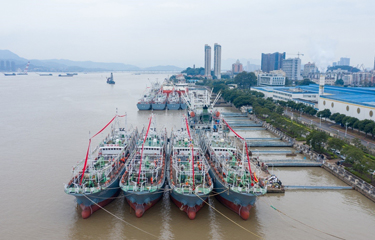Fuzhou, China-based Pingtan Marine has said it is expediting the modification and rebuilding of a new batch of fishing vessels to “further increase harvest capacity and volume,” despite China’s recent announcement of new fishing restrictions for Chinese vessels in the Indian Ocean.
In late May, China’s Agriculture Ministry said it will launch a voluntary fishing moratorium for Chinese distant-water vessels operating in the northern Indian Ocean. The ban follows up on a previous announcement from China banning Chinese-flagged vessels from fishing in the high seas of the southwest Atlantic each year between 1 July and 30 September and in the eastern Pacific open seas from 1 September to 30 November. However, the moratoriums have been criticized for being timed to coincide with the end of the fishing seasons in those regions.
Steve Trent, the founder and CEO of the Environmental Justice Foundation, which has detailed extensive illegal, unreported, and unregulated (IUU) fishing, labor abuses, and wildlife poaching by the Chinese distant water-fleet, said the new moratorium will not make up for the lack of transparency surrounding the Chinese fleet’s activities.
“While we are unable to say with certainty what prompted the …. partial moratoriums by China, it is likely the recent increased scrutiny of overfishing activities by China's distant-water fishing fleets in the fishing grounds concerned played a role,” Trent told SeafoodSource. “It is worth noting that while such moratoriums are a positive step in protecting our marine ecosystems, they should not overshadow the need for China and other international players, such as those countries that import the fish, to take structural steps including demanding full transparency along the entire supply chain and implementing measures to effectively control and regulate all distant-water fishing.”
Pingtan Marine previously said it had discovered a "previously unknown" squid fishery on the high seas of the Northwest Indian Ocean.
Pingtan Marine and Fuzhou Hong Dong Yuan Yang Fishing Co., another Fujian-based firm with overlapping owners and managers, operate 11 percent of China’s distant-water vessels, according to a recent study from the Environmental Justice Foundation.
At the end of 2021, Pingtan said 100 of the company's 142 vessels were fishing in international waters, with 12 operating in India’s Bay of Bengal and 17 fishing in Indonesia’s Arafura Sea. It did not disclose the operating locations of its other vessels. The company, which didn’t respond to requests from SeafoodSource for comment, reported its revenue grew by 102 percent to USD 62.8 million (EUR 67.1 million) year-on-year in the fourth quarter of 2021, as it recorded a net profit of USD 6.7 million (EUR 7.1 million). Its revenue for the full-year 2021 was USD 164.1 million (EUR 175 million), representing an 88.1 percent year-over-year increase. But the company recorded a net loss of USD 2.5 million (EUR 2.6 million), compared to a net loss in 2020 of USD 72.9 million (EUR 78 million).
Pingtan has recently run into both political and financial trouble as a result of its alleged linkage to IUU fishing. In December 2021, the U.S. State Department issued a notice that it had “revoked more than 15 visas for those complicit in IUU fishing who also have links to human trafficking, including associates of Pingtan Marine Enterprise Ltd.”
In April and May 2021, Pingtan received two warnings from the Nasdaq Stock Exchange, where it is listed publicly, after it failed to file financial forms mandated by the exchange. The company also faces potential delisting under the exchange’s bid price requirement, which requires the company’s stock price to finish above USD 1.00 (EUR 0.93) for 10 consecutive days by the end of June.
In 2017, Pingtan Marine was criticized by then-Indonesia Fisheries Minister Susi Pudjiastuti, who said she would file a claim of fraud with the Nasdaq Stock Exchange, saying that “there is no such company [Pingtan] in Indonesia.”
Pudjiastuti claimed Pingtan was supported through massive state loans, generous subsidies, and Communist Party connections.
“It’s not just a fishing company — it’s practically a Chinese government asset,” she told the Associated Press.
In May 2022, the nonprofit Center for Advanced Defense Studies, which provides analysis on transnational security issues, called for the U.S. Securities and Exchange Commission and the Nasdaq Stock Exchange to delist Pingtan Marine due to its alleged linkages to illegal activities.
Nasdaq declined to comment on Pingtan’s status when contacted by SeafoodSource.
Regardless of whether it’s able to boost its stock price – which is currently sitting above the USD 1.00 threshold – Pingtan may face delisting from the Nasdaq as a result of new auditing requirements for Chinese companies listed publicly on U.S. exchanges. In April 2022, Chinese regulators acceded to a U.S. request that Chinese firms listed on American exchanges make their audits available for inspection to the U.S. Public Company Accounting Oversight Board (PCAOB).
Nevertheless, Pingtan continues to expand its fleet, including the January announcement it launched what it’s claiming is the country’s largest reefer vessel. The rebuilt refrigerated transport vessel, Fu Yuan Yu Yun 992, is 132.06 meters in length and has a gross tonnage of 8,374. It’s the largest fishery support vessel in China “so far as approved by the Ministry of Agriculture and Rural Affairs of the People's Republic of China,” according to a Pingtan statement.
However, in an announcement accompanying its 2021 results, Pingtan confirmed it is suspending the construction of an Antarctic krill vessel to “recover funds.”
Pingtan Marine Chairman and CEO Xinrong Zhuo said in a statement to investors that Pingtan’s pricing power has been eroded by the COVID-19 pandemic as processing factory clients cut or delayed purchases. But he said his company managed to deliver a 54.4 percent increase in sales volume in 2021, reaching to 129,993 metric tons (MT), up from 84,185 MT in 2020.
“Due to the market downturn, the company recorded a decreased gross margin for the 2021 fiscal year, albeit a slightly increased gross profit-margin in the second half of the year,” Zhuo said.
Photo courtesy of Pingtan Marine







